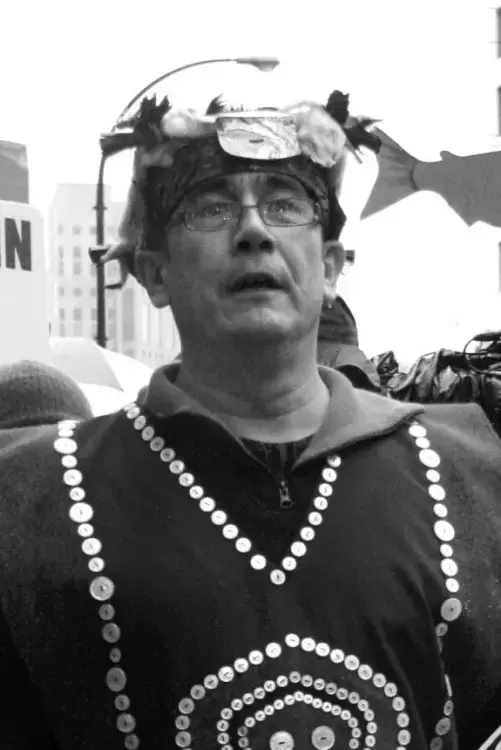Chief Bob Chamberlin of the Kwicksutaineuk-Ah-Kwaw-Ah-Mish First Nation (Gilford Island) attended the Council of Ha’wiih meeting at Maht Mahs on Jan. 18 to face the hereditary chiefs of the Nuu-chah-nulth territories.
“I stand here and I apologize,” he said.
Chamberlin said he was looking to build a bridge and hear concerns about the things that he had possibly said in his campaign to fight fish farms in his own territory.
“At no time has there been any effort to be disrespectful,” Chamberlin explained. He said there may have been some confusion over comments made by representatives of the Musgamagw-Tsawataineuk Tribal Council to which Kwicksutaineuk-Ah-Kwaw-Ah-Mish is a member. He said those representatives did not speak for Kwicksutaineuk-Ah-Kwaw-Ah-Mish or Chamberlin either.
Chamberlin spoke before the entire group of Nuu-chah-nulth ha’wiih, but his words were directed specifically to the Ahousaht contingent. Ahousaht has fish farms within its territory, and recently negotiated a renewed protocol agreement with Mainstream Canada, one of the largest salmon farming operations on Canada’s West Coast.
The Norwegian company’s operations have been the target of Chamberlin’s criticism for some time. One third of the fish farming operations are in Nuu-chah-nulth territory, and one third is in Chamberlin’s territory.
Chamberlin said he respected the title holders’ right to decide what kinds of development they will allow within their own territories. Indeed, when speaking to Ha-Shilth-Sa during a recent March for Wild Salmon through Vancouver, Chamberlin made certain the paper understood he respected the Ahousaht ha’wiihs’ decision to allow fish farming within their territories.
He said he had been chief of Kwicksutaineuk-Ah-Kwaw-Ah-Mish for six years. His first priority was to address potable water issues with the federal government, and then he turned his attention toward the aquaculture operations at the request of the title holders of his community.
Chamberlin said he had the highest respect for the Nuu-chah-nulth and remembered fondly standing with them the day they won their fishing rights case in BC Supreme Court.
In response to Chamberlin’s comment, Ahousaht Tyee Ha’wilth Maquinna Lewis George explained how the Ahousaht/Mainstream protocol came about, even with some opposition to fish farming within his territory.
But the protocol put Ahousaht people to work.
“We didn’t want to see our guys on the welfare line,” Maquinna said. “Welfare isn’t going to feed them like they should.”
Maquinna said logging had destroyed the fishing in the rivers and streams.
“We’re just starting to get the herring stocks back after overfishing (occurred),” the tyee explained.
“We don’t want to see the salmon disappear. We disagree with the reasons why the salmon are disappearing.” He said logging and overfishing are the culprits.
Maquinna said he heard Chamberlin’s complaints, and he is “all for saving the salmon.” But he said he can’t have people telling Ahousaht to shut the fish farms down in his territory. He said Mainstream and the mining operator currently exploring in Ahousaht territory are the only operations respecting his ha’houlthee (chiefly lands).
Wally Samuel was one of Ahousaht’s negotiators for the protocol agreement. He said Mainstream “was the only company that has come to us and respected our authority in our territory.”
“We are wild salmon people,” said Samuel. “Wild fish people. We do love our wild fish. Our protocol contains very strict conditions. They (Mainstream) are told where they can put the farms.” He explained there are pristine areas charted out in the protocol. Protected also are spawning beds and clam beds and other areas of the environment.
“We know who you are,” Maquinna told Chamberlin. “We respect you. You were there singing with us in Calgary to get A-in-chut (national chief of the Assembly of First Nations) elected.”
Maquinna said he was not offended by what Chamberlin was doing in his own territory, but it is jobs that Ahousaht is concerned about.
He thanked Chamberlin for coming before the Council of Ha’wiih and standing up to speak to the issue.
Tseshaht Chief Councillor Les Sam also thanked Chamberlin for addressing the Council of Ha’wiih.
“I admire his courage, and standing before us and dealing with this issue.”
Nuu-chah-nulth Tribal Council Vice-president Priscilla Sabbas-Watts said she knew first-hand the respect Chamberlin has for the Nuu-chah-nulth people.
“It’s our honor to have you stand before us. I hold you in high regard and with respect.”
In closing, Chamberlin thanked the Nuu-chah-nulth for taking the time to teach him.
“I appreciate this very much because it helps me understand the different perspectives, and it helps me to be able to stand up and represent you in the future.” Chamberlin was recently elected as vice-president of the Union of BC Indian Chiefs.
“I will be with the Nuu-chah-nulth to help in any way that is needed.”







